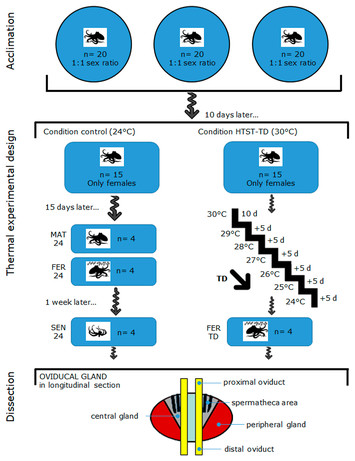PeerJ Section
Aquatic Biology
Welcome to your community’s home at PeerJ. Sections are community led and exemplify a research community’s shared values, norms and interests.
The citation average is 5.1 (view impact metrics).
18,792 Followers
Section Highlights
View all Aquatic Biology articles 

5 April 2022
Sequentiality of beetle communities in the longitudinal gradient of a lowland river in the context of the river continuum concept
"This manuscript provides important insights on the effects of longitudinal gradients in beetle communities."
 Daniel Silva, Handling Editor
Daniel Silva, Handling Editor
 Daniel Silva, Handling Editor
Daniel Silva, Handling Editor

30 March 2022
Oviducal gland transcriptomics of Octopus maya through physiological stages and the negative effects of temperature on fertilization
"As one of the reviewers stated: "Notable genes involved in octopus fertilization are known for the first time. Their potential application on other octopus species to evaluate the effect of global warming on wild populations and even in aquaculture is significant.""
 James Reimer, Section Editor
James Reimer, Section Editor
 James Reimer, Section Editor
James Reimer, Section Editor

29 March 2022
Mechanisms and potential immune tradeoffs of accelerated coral growth induced by microfragmentation
"The markedly increased coral growth rates due to microfragmentation has been of interest to coral biologists. This paper improves our understanding of the biological process as well as the tradeoffs and consequences associated with this method of restoration that is commonly being used in the Caribbean,"
 Anastazia Banaszak, Handling Editor
Anastazia Banaszak, Handling Editor
 Anastazia Banaszak, Handling Editor
Anastazia Banaszak, Handling Editor

8 February 2022
Description of a new and widely distributed species of Bathypathes (Cnidaria: Anthozoa: Antipatharia: Schizopathidae) previously misidentified as Bathypathes alternata Brook, 1889
"Molodtsova and colleagues discover a new and likely cosmopolitan species of the ecological and economical black coral, which are often reported in deep-sea surveys, revealing how little we know about the deep ocean."
 Joseph Gillespie, Handling Editor
Joseph Gillespie, Handling Editor
 Joseph Gillespie, Handling Editor
Joseph Gillespie, Handling Editor

1 February 2022
A revision of Plectanocotyle (Monogenea, Plectanocotylidae), with molecular barcoding of three species and the description of a new species from the streaked gurnard Chelidonichthys lastoviza off Algeria
"An excellent combination of molecular and morphological analyses to examine and reconsider a genus of parasitic Monogenea."
 James Reimer, Handling Editor
James Reimer, Handling Editor
 James Reimer, Handling Editor
James Reimer, Handling Editor

26 January 2022
Potential impacts from simulated vessel noise and sonar on commercially important invertebrates
"Important information on how marine invertebrates can be affected by anthropogenic sound."
 James Reimer, Section Editor
James Reimer, Section Editor
 James Reimer, Section Editor
James Reimer, Section Editor

5 January 2022
Prior exposure to weathered oil influences foraging of an ecologically important saltmarsh resident fish
"Excellent work investigating the sublethal effects of contaminant exposure on the feeding behavior of fish."
 James Reimer, Section Editor
James Reimer, Section Editor
 James Reimer, Section Editor
James Reimer, Section Editor

5 January 2022
Effectiveness of antifungal treatments during chytridiomycosis epizootics in populations of an endangered frog
"Understanding how current treatments actually translate into better amphibian survival and recruitment is important to retrospectively assess management efforts and plan future actions."
 Patrick Bergeron, Handling Editor
Patrick Bergeron, Handling Editor
 Patrick Bergeron, Handling Editor
Patrick Bergeron, Handling Editor

24 December 2021
Molecular genetic diversity of seaweeds morphologically related to Ulva rigida at three sites along the French Atlantic coast
"Ulva seaweeds have and are difficult to distinguish morphologically and molecular studies explain their genetic diversity and characterise populations."
 Mark Costello, Handling Editor
Mark Costello, Handling Editor
 Mark Costello, Handling Editor
Mark Costello, Handling Editor

22 December 2021
Unique spicules may confound species differentiation: taxonomy and biogeography of Melonanchora Carter, 1874 and two new related genera (Myxillidae: Poecilosclerida) from the Okhotsk Sea
"In this scrupulous paper four new species of unique Demosponges genus Melonanchora are described from different localities across the Atlanto-Mediterranean region. A thorough revision of this genus was carried out, which made it possible to distinguish a new genus, Arhythmata gen. nov. This paper will be of interest not only to sponge specialists, but also to anyone interested in the taxonomy and biogeography of benthic invertebrates."
 Alexander Ereskovsky, Handling Editor
Alexander Ereskovsky, Handling Editor
 Alexander Ereskovsky, Handling Editor
Alexander Ereskovsky, Handling Editor
Collections
View all 
18,792 Followers


